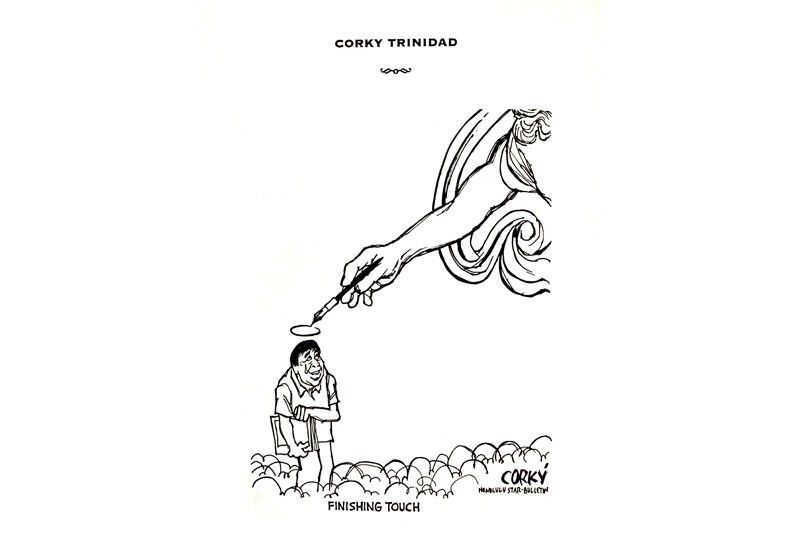How they want to be remembered


There’s a joke that if certain people write their epitaphs, they will be like these:
• Somebody who’s always late for appointments — Here lies the late Mr. X. Late as always.
• Somebody who tells lies — Here lies Mr. Y. He lies and lies and lies.
• Somebody who keeps on forgetting — Here lies Mr. Z. He forgot to breathe.
Seriously now, back then Larry King (the lovable host of CNN’s Larry King Live) published a book called Remember Me When I’m Gone in which he asked the rich and famous to write their own epitaphs and obituaries. I dug up the old book (circa 2004) from my baul just in time for the commemoration of the All Souls Day, and I’m sharing with you some of them, some long ones and one person gave just a one-word answer — Imagine! (by Yoko Ono).
Christopher Lee (famous for playing Dracula and as Saruman The White in the Lord of the Rings trilogy):
As an actor, I would wish to be remembered for a body of work, rather than for a few glittering years of celebrity among the pygmies of our fine profession. During my career, I have met and worked with so many decent, dedicated, loyal and intelligent members of my profession, which is what I will remember. We are not all rogues and vagabonds. There will be nothing written on my gravestone about me: who could top Vincent Price’s “I’ll be back.” I am content. Sometimes I feel that all this was done by somebody else. At least, I feel I could say, “He was different.”
Neil Sedaka (singer of such enduring hits as Stupid Cupid, One Way Ticket, You Mean Everything to Me, Happy Birthday Sweet Sixteen, Oh! Carol and many others):
My creative person always had to struggle with issues, and always had a dross to bear. I felt things to a greater degree than other people. Many times, I lived through my art and music, realizing that life can be cruel. I painted lyrics and music of beauty and fantasy, a world far better than our real world. I hope my work will go on long after me, perhaps giving hope and joy to others. I tried to take people away from fears and depression in this crazy world. We only have fleeting moments of happiness.
I had no secrets. I found it difficult to play mind games with others. People had to like me as I was. I couldn’t always please others all the time, though I tried desperately. Finally, in the end, I had to please myself.
I was fun to be around. A nice person, caring and sensitive. I was passive and sometimes a pushover. But if someone crossed me, I would reject their friendship. Being an artist, I would think with my heart and not my head.
I had a wonderful family, and good friends. I have no regrets.
Patch Adams (a prominent physician who helped and healed thousands of ill children...also a professional clown and a social activist, a performer whose multiple talents extended beyond medicine. He was portrayed by the late Robin Williams in a movie):
Don’t remember me when I am gone. Remember to serve the causes of peace, justice and care. As Albert Einstein said, “Only a life lived for others is a life worthwhile.”
I lecture three hundred days a year all over the world and come with a message for compassion and generosity in action. Then I’m gone, so I’m faced with this remembering when I am gone almost daily. I work hard to crush the experience of awe for fame, saying, “Forget me. Remember the call to service.” Having served now almost forty years, I have an opportunity to hear frequently how people felt influenced by me (I hear that they mean influenced by my words and example). I work to be more skilled for a broader diversity of that influence. So I don’t care about my eulogy or epitaph; I care every day to see how I can be a better instrument for peace, justice and care while I am alive. If the influence to serve others lives after I die, then happily I’m the (ideas) not gone, and the rememberings are in acts of care.
Larry King:
I would like to be remembered as a kid from Brooklyn who probably would have preferred to become a first baseman or a pitcher for the Brooklyn Dodgers, but who never made it.
I am, of course, proudest of my kids and madly in love with my wife.
But above all, I would like to be remembered as a broadcaster who has perhaps interviewed more people than anyone in history, from kings and queens to presidents, from movie stars to legendary athletes, from writers to Nobel Prize winners, from saints to sinners, I have talked to them all. I am grateful to the listeners who have kept me going all these years, and I hope that fifty years from now when people talk about Larry King, they will say, “He did a hell of an interview.”
Kenny Rogers (a country music legend whose well-loved songs include Through The Years sung by an emotion-charged Zsa Zsa Padilla during the wake for her beloved Dolphy):
A Life
If you look upon life’s journey
As a single day in life
You’ll spend half your time in darkness
And the other half in light.
If the early morning hours
When the sun comes breaking through
That life’s colors, shapes and shadows
Have the most to offer you.
When the sun is at its brightest
And its heat is in your eyes
It’s hard to know which road to take
Or where your future lies.
It’s just as hard to see in total white
As it is in total black
But it’s harder yet to see that
‘til you’re past and looking back.
But there’s beauty in the sunset
As the colors fade away
It’s God’s gift to those who persevere
Through the bright part of the day.
And as you watch the sunset
You’ll feel better if you know
When you reach your darkest hour
There’s a better place you go.
(Note: According to Larry King, Kenny Rogers wrote it as a gift to Rogers’ son Christopher on Nov. 22, 1996.)
(E-mail reactions at rickylophilstar@gmail.com. For more updates, photos and videos, visit www.philstar.com/funfare or follow me on Instagram @therealrickylo.)
- Latest
- Trending





























